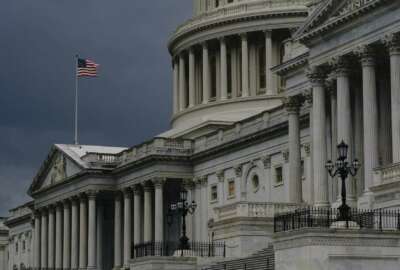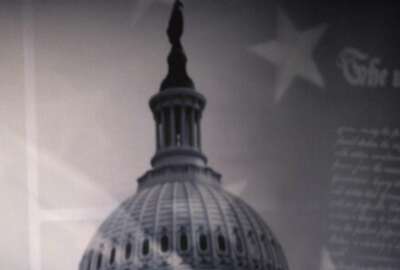
Both chambers back to hopefully hammer out CR
The House joins the Senate this week in getting back to work in Washington. The prospects for a continuing resolution to take effect October 1 are looking good....
Best listening experience is on Chrome, Firefox or Safari. Subscribe to Federal Drive’s daily audio interviews on Apple Podcasts or PodcastOne.
The House joins the Senate this week in getting back to work in Washington. The prospects for a continuing resolution to take effect October 1 are looking good. But that’s about all that looks good. Federal Drive with Tom Temin got the latest now from WTOP Capitol Hill correspondent Mitchell Miller.
Interview transcript:
Tom Temin: Mitchell, let’s start with that CR idea. It seems like everyone in Congress agrees we’re not going to get the budget done, so we’re going to go to a CR — fairly routine?
Mitchell Miller: Yep. This is the one bright spot of all the things and all the wrangling that’s going on related to the coronavirus relief bill and how nothing really getting done on that front. But neither party nor the White House really wants the specter of a government shutdown during the nation’s worst health crisis in more than 100 years. So they’ll do as you said, what they always do, go to that continuing resolution. It doesn’t really look like there are any bumps in the road right now. Sometimes there are as you know, House Speaker Nancy Pelosi last week reiterated she is committed to a clean CR, so no additional amendments, no poison pills, the White House Treasury Secretary Mnuchin has indicated he is also on board with that too. So this is the one thing that the House and Senate will likely make progress on with lawmakers back here in Washington, wel’l likely get votes on that in the coming weeks ahead of the start of the new fiscal year on October 1. But it’s going to be interesting over the next few weeks because the House comes back after the Senate failed to get through any advancement on the Republican COVID-19 bill last week. And that was actually less money than the GOP had previously proposed. House Democrats keep pointing to that $3 trillion legislation that they passed months ago. That’s a non starter for Republicans. So if anything, both sides seem to be moving more apart than they were earlier this summer on coronavirus relief, and it’s really clear time that neither side is ready to blink before the election. So I don’t see much movement on a major measure. That means once the President’s executive order for those additional $300 and unemployment benefits runs out, which comes from FEMA money, as you know, millions of Americans will again be with additional federal assistance on an unemployment.
Tom Temin: Yeah, it seems like the election coming up, it has the feeling I’ll just be honest of perhaps the most consequential one since 1860. With respect for policy ahead in the United States. Maybe 1932? I don’t know. Do you get the sense that that is washing over on Capitol Hill also?
Mitchell Miller: I do. Because, there was, as you know, over the months of the summer, there was a lot of talk and they kept acting as if they might eventually reach an agreement, that their talks were always ongoing. The White House tried to remain upbeat, Mnuchin would try to say some positive things about the way things were going, and even when they were digging in both sides seemed to try to say that we’re going to get something done. But as we keep getting closer and closer to election day, it seems like they dig in harder and harder. And it’s clear, I think that both parties have decided, okay, we’re just going to take our position here, and we’re just going to let the voters decide whether that was a mistake or not. And so they’re rolling the dice a little bit. Some moderate Democrats, for example, in the House are a little bit nervous about the fact that nothing has actually been done. They said they’ve heard from constituents when they’ve been back in their district saying, well can we at least get something more moderately done, a skinny bill again on the House side. But House Speaker Pelosi has indicated while she understands their concerns, they are not going to budge on their move, and neither are they going to do so on the Republican side.
Tom Temin: Right. And the other thing they’re not going to make deadline with respect to the fiscal year is the National Defense Authorization Act. I think now some of the leadership on the Armed Services Committee say that’s going to be after the election also, which of course, is technically in the next fiscal year.
Mitchell Miller: Right. And as you know, that is very rare because that’s one of these few major pieces of legislation that every year in Congress they proudly point to the fact that it always gets passed, it never gets held up. But even that, I mean that shows you the seismic reverberations of the election that they would have to actually push that back into the next year. So you’re right, I think this is going to be an election where we’re probably not going to feel the impact like we’ve felt it for decades. And what’s also interesting, too, is that I think this reflects why both parties are sticking with their positions is polls have indicated that something along the lines of 90% of Americans have already made up their minds of who they’re going to vote for. So clearly, both parties are sticking with their camps.
Tom Temin: Yeah, they could save a lot of money on advertising, I suppose.
Mitchell Miller: That’s right.
Tom Temin: A couple of topical issues. What about the temporary payroll tax deduction for social security taxes that the President has ordered federal employees to have?
Mitchell Miller: Right. Well, this is the one where you get more money now in your paycheck, but you’ll have to make up for it in 2021 as they defer those payroll taxes and this is yet again another issue that’s become politically embroiled. The President wants to show that he’s doing something to help people so he pushed very hard to get this deferral of payroll taxes. And actually a lot of Republicans didn’t really want him to do that. But he pushed ahead with it. And so while private companies have been able to opt out of this, as you know, federal agencies have not been able to opt out of that. So that’s coming and right now Democrats are really upset by this. Maryland Senator Chris Van Hollen has called it a payroll tax scheme. He and other lawmakers, including Maryland, Congressman Jamie Raskin have been really pushing hard for the administration to give some of these government agencies a little more flexibility with dealing with it. It doesn’t look like there’s going to be any change. Van Hollen and some other lawmakers, including Republican Susan Collins of Maine sent a letter to the Treasury Department, the Office of Management and Budget, saying that something needs to be done with this and they’ve been getting a lot of complaints also from the unions for federal workers, but right now it just doesn’t really look like it’s going to change.
Tom Temin: Got it. And the other issue is the Postal Service which nobody’s happy with, or at least the Democrats aren’t happy with right now for a variety of reasons. And that’s all got wrapped around the old axle of Postal Service reform. Besides all of the Sturm and Drang, can anything happen this year, do you think?
Mitchell Miller: I really doubt it. I mean, I think we’re gonna get a lot of fireworks at another committee hearing, this will be Virginia congressman Gerry Connolly’s government operations subcommittee, which of course oversees the Postal Service, we should get more details on what’s happening or not happening with mail delivery and preparations for mail and voting. Also, of course, this comes after the House Oversight Committee, which Connolly serves on announced plans overall to investigate the Postmaster General Louis DeJoy following that Washington Post report that he encouraged his employees at his North Carolina company to donate to Republicans and then allegedly gave them bonuses to cover the donations, that would of course be illegal. Democratic lawmakers have suggested DeJoy may have lied under oath and Connolly and others have said that he should step down. Members of the Postal Service’s Board of Governors have said they have confidence in DeJoy. So as for mail and voting, it’s ramping up and DeJoy is scheduled to meet this week with secretaries of state to check on how the mail in voting is going. But as far as reforms at the Postal Service, as you say, there is so much drama with both parties that it doesn’t really look like much is going to get done with that other than a lot of noise coming out of these oversight hearings.
Tom Temin: And last week, there were some hearings with respect to the Census Bureau, which did not get the extension it wanted for delivering its final information from Congress, but had started late because of the pandemic. So they have the squeezed timeframe to try to get the count done. But that doesn’t look like Capitol Hill will be able to really do anything at this point either.
Mitchell Miller: No, a lot of noise came out of that hearing as well, another virtual hearing. But it looks like every single agency you can possibly imagine is somehow embroiled in politics, not surprising during a presidential year. But even more so as we’ve talked about during this year, the Census Bureau has just been kicked around a lot during this with the administration pushing one way and the Democrats pushing the other way trying to figure out exactly how they’re going to get what they need to do during this pandemic done. But right now, it just doesn’t look like there are going to be any real major changes related to the Census Bureau, even though a lot of people are calling for them.
Tom Temin: Yeah, maybe they could come up with a new slogan for themselves to help and say, we’re Census Bureau, we count.
Mitchell Miller: That’s right.
Tom Temin: I don’t know just a free suggestion. Mitchell Miller is Capitol Hill correspondent at WTOP. As always, thanks so much.
Mitchell Miller: You bet.
Copyright © 2024 Federal News Network. All rights reserved. This website is not intended for users located within the European Economic Area.
Tom Temin is host of the Federal Drive and has been providing insight on federal technology and management issues for more than 30 years.
Follow @tteminWFED




